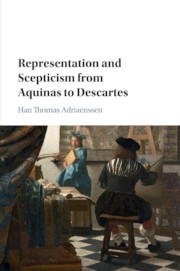7 - From Representation to Object
from PART III - REPRESENTATIONS AND SCEPTICISM
Published online by Cambridge University Press: 13 July 2017
Summary
Surely the most important task of species and ideas was to represent objects in the external world to us. But can such devices actually do this job? According to representation problems, they cannot. We find this kind of problem in the medieval reception of species and the early modern reception of ideas alike, and this raises the question of whether the critics of species and ideas developed the issue in the same way.
In some respects they did. Thus as we will see in section 7.1 below, philosophers from both periods worried that, if all we ever see directly are species or ideas, it is not clear that we will actually see these devices as representations of other, external objects. As a result, even though all by themselves, devices like species and ideas may well have the potential to make us think of external objects, this is a potential that will remain largely unused by a perceiver lacking direct access to these objects. The ultimate worry here is that she will just see the devices present to her as objects in their own right.
But although philosophers from both periods voiced this worry, section 7.2 will explore an important difference between the critical receptions of species and ideas. As we will see there, not only did early modern philosophers question whether someone behind a veil of ideas would actually see the direct objects of perception as representations, but moreover, they doubted whether ideas in the immaterial mind had the potential to represent external objects at all. The fear was that, by their very nature, ideas are just not the kind of things that could be about extension and thus make us think of the material world we live in. It was this worry that, according to one scholar, was eventually to lead to the downfall of the Cartesian psychology. But for all its prominence in the early modern reception of ideas, section 7.2 will argue that this problem had no clear counterpart in the earlier criticism of species.
Unused Representations
A proponent of the species theory himself, the Franciscan theologian John Peckham (1230–1292) in his questions de anima defends the theory by going through a number of possible objections.
Information
- Type
- Chapter
- Information
- Representation and Scepticism from Aquinas to Descartes , pp. 223 - 237Publisher: Cambridge University PressPrint publication year: 2017
